The Thieves Left That Behind
Moon Viewing, Wandering, and Reading Pessoa in Porto
Dear Reader,
Greetings! Summer mode continues for me, and I hope that it does for you as well. With everything we are dealing with in the world at present, we might at least try to slow the pace, such that we can look to the care of our selves.
Speaking of slowing things down, I am thinking about planning two reading-retreat weeks each year, held in places of ecological and literary interest. Please let me know if you might be interested in participating — via the comments, e-mail, or DM on social media.
This is the second and final free installment of my Bird on the Wing travel series. Become a paid subscriber now to receive upcoming missives from London, Kentucky, and the rocky coast of Maine.
The Thieves Left That Behind
My flight into Porto was late. Quite late. We were supposed to arrive at 10 PM, but that turned into 11. Then came a snafu at the airport. I finally found myself in a taxi at 11:30. The driver took off like a racehorse. Last trip of the night? Rendezvous in the works? I could only imagine as I clung to the handle above the passenger window, my fate in his hands.
Safely arrived at midnight, I pulled back the shutters in my little rented flat in the center of the old town — to find a huge moon rising over the grand monastery of Serra do Pilar, which sits like a frosted cake atop the ridge on the south side of the River Douro. I stared for a while across the tiled rooftops of Portugal’s second city. It was a commanding moon, a peaceful moon, and I consulted it respectfully. Our solitudes addressed each other.
I had traveled to Portugal to research the idea of organizing reading and writing retreats for Frugal Chariot. But I arrived just after my third memorial service in six weeks, and on the heels of losing a lifelong friend and radiant soul to cancer. I was feeling emptied out, strangely uninterested in connecting with others or in planning for the future. And then there was the news. So much bad news. I thought of the Joni Mitchell song “Moon at the Window.”
Betsy's blue
She says "Tell me something good!"
You know I'd help her out if I only could
Oh but sometimes the light
Can be so hard to find
At least the moon at the window
The thieves left that behind
The book I’d stashed in my knapsack for this trip was The Book of Disquiet by Portuguese writer Fernando Pessoa (1888-1935). Pessoa was both anti-social (reclusive) and pro-social in his idea that each person might not be a single self: in his writings he created multiple personae, terming them heteronyms. Pessoa, who was active in Lisbon literary circles, published relatively little during his lifetime, lived quietly, and drank excessively. The Book of Disquiet, his magnum opus, has been compiled by editors from thousands of manuscript fragments that were discovered in a steamer trunk after the author’s death. Pessoa is a cultural icon in Portugal. As the great philosopher and critic Eduardo Lourenço put it to Michael Kimmelman in 2008, during a fracas over the sale of some of Pessoa’s papers, “He is the most tragic of the Portuguese poets. The pleasure of unhappiness is particularly Portuguese.”
Richard Zenith, Pessoa’s brilliant English-language translator and biographer, calls the collection “a large but uncertain quantity of discrete, mostly undated texts left in no sequential order, such that every published edition — inevitably depending on massive editorial intervention — is necessarily untrue to the nonexistent ‘original.’” Critic Parul Sehgal offered a memorable comment on the task facing the editors of The Book of Disquiet: “You might as well lasso a cloud.” Yet the artful arranging of these astonishing fragments has been a gift to readers.
The blond light of the golden moon shines out of the east. The shimmer it forms on the wider river opens into snakes on the sea.
For this traveler — adrift, cloud-like, in a sky of grief — the disquieted narrator’s dreamlike manner of being awake, his interiority and gloomy watchfulness, wove a kind of traveling cloak for the journey.
By thinking so much, I became echo and abyss. By delving within, I made myself into many. The slightest incident — a change in the light, the tumbling of a dry leaf, the faded petal that falls from a flower, the voice speaking on the other side of the stone wall, the steps of the country estate, the courtyard with an arch and houses clustered around it in the moonlight — all these things, although not mine, grab hold of my sensory attention with the chains of longing and emotional resonance. In each of these sensations I am someone else, painfully renewed in each indefinite impression.
“All these things, although not mine, grab hold of my sensory attention.” That is just how it felt as I walked and walked the streets and avenues of Porto. Here a cat snoozing on a doorstep, there a little yellow car, and morning glories clinging to a facade with more success than its tiles. I covered eight to ten miles each day.
One evening I strolled to the Casa da Musica, a grand hall designed by Rem Koolhaas, with a plaza favored by skateboarders. For all of six euros, I heard an excellent local string quartet play music by Mozart, Shostakovich, and the Portuguese composer Telmo Marques. The Marques piece, Ilhas Fortunadas (“The Blessed Isles”), is based on a poem by Pessoa about Portugal’s Atlantic islands: the Azores, Cape Verde, Madeira, the Canaries.
These are the blessed isles
Lands that exist beyond space
Where the king lives, waiting.
But we, if we wake,
Must hush, for there is only the sea.
On the way home, I stopped at a café for mushroom toast with local shrimp served in a copper pot, before meeting up again with the moon.
Another day, I took the train to the compact city of Guimaraes, where Portuguese nationhood is said to have been created in the Middle Ages. There one finds a ducal palace and a big chunky ruined castle. I later learned that both were extensively restored by Portugal’s twentieth-century dictator António de Oliveira Salazar, who during his thirty years of rule may have identified with the autocratic Braganza dynasty that got its start in this city. I did love the ceiling of the palace banquet hall, which looked like the overturned hull of a giant galleon.
Guimaraes has a splendid, intact architectural fabric of medieval and later buildings surrounding gracious piazzas — or in Portugese, praças.
Thunderstorms moved through Porto as I made my way back from the São Bento train station, famous for its glorious tile murals. I ducked into the bar of the Hotel Casa da Companhia for beet tartare and roasted cod, while the lightning cracked and rain soaked the tourists on the Rua das Flores. Pessoa is exceptionally good on rain.
It’s raining hard, harder, still harder . . . It’s as if something were going to collapse in the blackness outside . . .
The city’s uneven, mountainous mass looks to me today like a plain, a plain covered by rain. All around, as far as my gaze reaches, everything is the pale black color of rain.
Or this genius bit of Modernist emo:
Each drop of rain is my failed life weeping in nature. There’s something of my disquiet in the endless drizzle, then shower, then drizzle, then shower, through which the day’s sorrow uselessly pours itself out on the earth.
There are points at which The Book of Disquiet can become weirdly hilarious. The narrator occasionally dispenses one-liners like “To have touched the feet of Christ is no excuse for mistakes in punctuation.” And “One of my life’s greatest tragedies is to have already read The Pickwick Papers. (I can’t go back and read them for the first time.)” Then he (by way of his editors) inevitably reverts to his key themes of despair and futility, under titles like “Dolorous Interlude” and “Aesthetics of Discouragement.” Sometimes I just felt like laughing, and that was good.
On my last day I walked for miles in hot sun, along the Douro and then up a steep ridge.
Although my destination was the Serralves Foundation, along the way I happened upon the Botanical Garden that is part of the University of Porto. I wandered happily among the many unfamiliar plants and trees, and stopped for coffee beneath an arbor as chickens ambled by.
Serralves was a haven, and very stimulating: an outstanding contemporary art museum and a historic Art Deco villa crown the 45-acre site. I took in a fascinating exhibition of paintings created during the pandemic by the L.A.-based artist Mark Bradford.
Formal gardens, ornamented with contemporary sculpture by artists like Ai Weiwei, descend the hillside to a demonstration farm in the valley below, populated by heritage cattle and burros with fuzzy ears as big as plantains.
I flew back to London one day early. Perhaps I had walked myself out of feeling like an echo and an abyss. But I was, and remain, thankful for the way in which Porto let me trace my sorrows down its side streets and make my rendezvous with Pessoa — and that moon. The city gave me respite from the banditry of history and time.
If You Go . . .
Lodging:
I moon-gazed obsessively from this AirBnb. The flat was sensitively renovated, professionally managed, and surprisingly quiet given the location.
Tours:
I took an excellent architectural walking tour of Porto with a guide booked through Context Travel. José Luís was a font of information, and he tailored the tour to my literary interests.
Although I did not delve into the wine and port industry on this trip, there are extensive tours and many tasting rooms in Porto, especially on the opposite side of the Douro. A funicular can take you from that part of town up to the monastery. The beautiful Douro Valley wine country nearby is accessible by car, boat, and train.
Food:
I had a light after-concert bite al fresco at 5B Gastronomica e Arte, which is set in a pretty little square not far from the Casa da Musica.
I wish I had ordered more than coffee at Maria Dentada, the café set on the grounds of the Jardim Botânico. The food looked delicious.
Dinner in the bar at Casa da Companhia was scrumptious, and the service very friendly.
In Guimarães, I stopped for lunch at Résvés Restaurante, which has patio seating above one of the city’s pretty squares.
Books!
Livraria Lello is world famous and deservedly popular.
If the line to get in to Lello is too long, repair to BASE Porto for a revelatory coffee shaken with ice (like a martini!), and enjoy it under one of the shade trees on offer. Cushions and tables are also provided. The lady behind the counter asked each customer where they were from, and rang a little bell with glee every time someone left a tip in the jar. “Tipping from Boston today!”
Sending love to all. Stay strong. xo Nicie

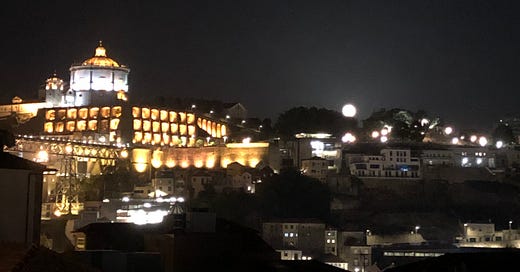




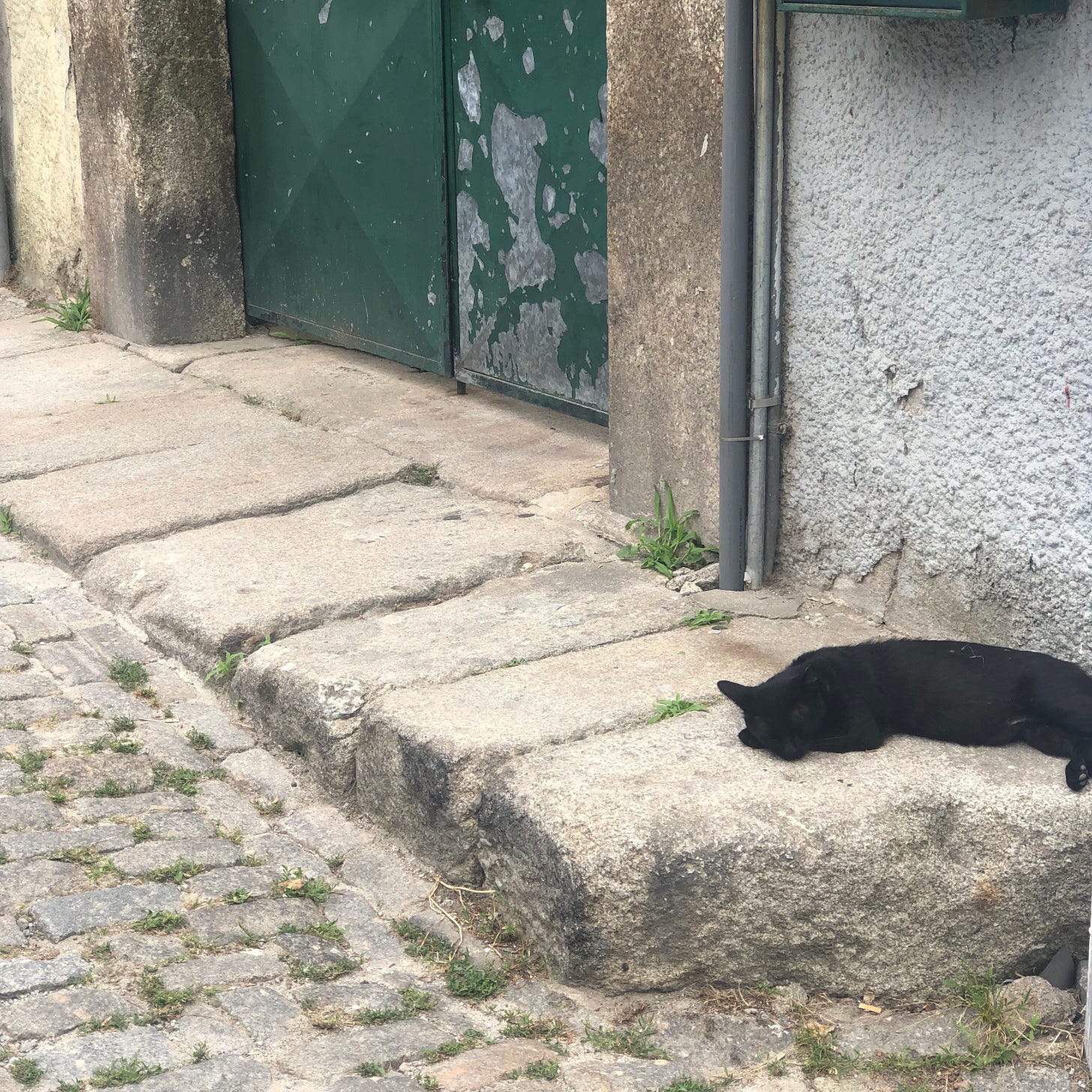













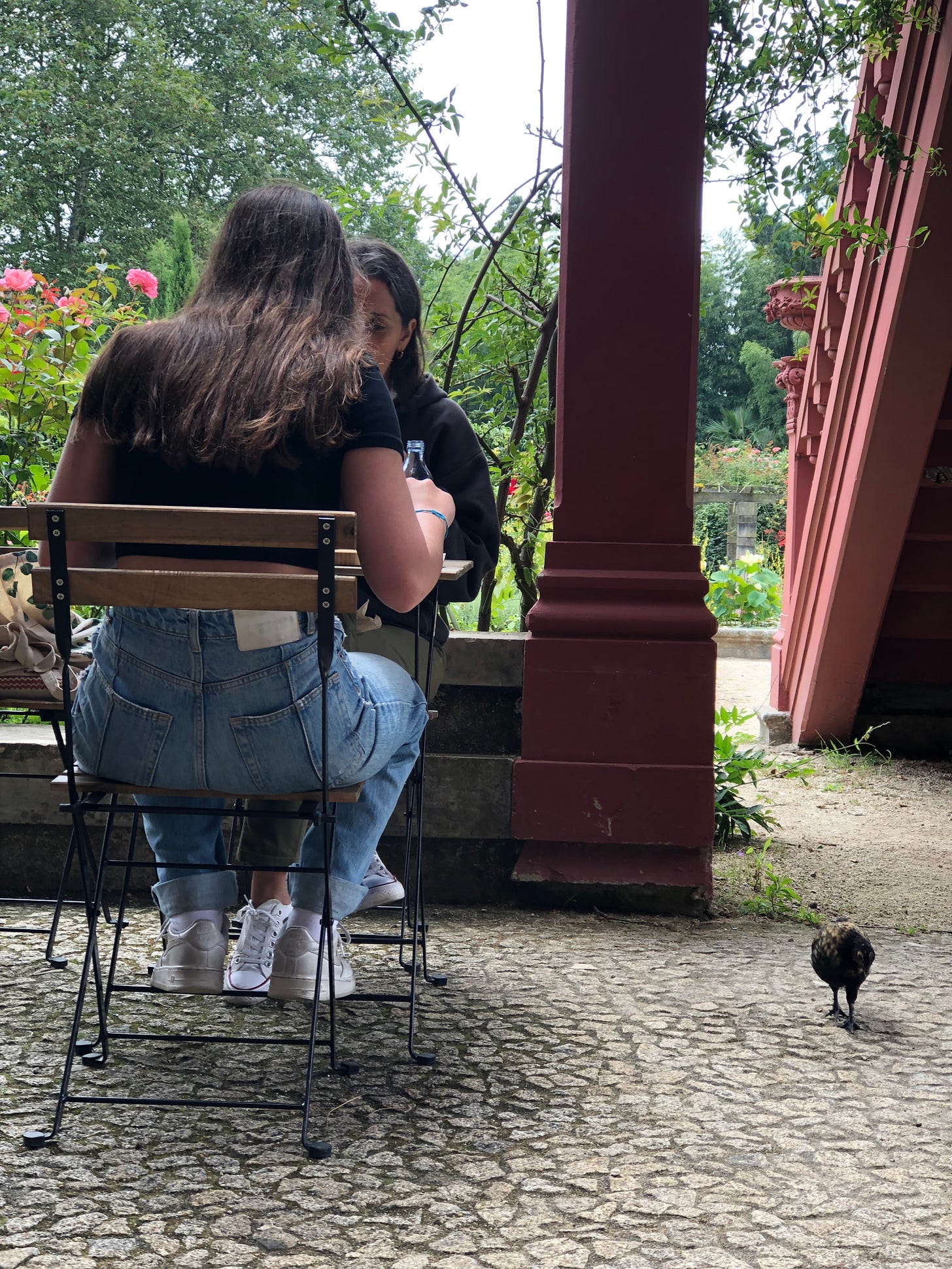
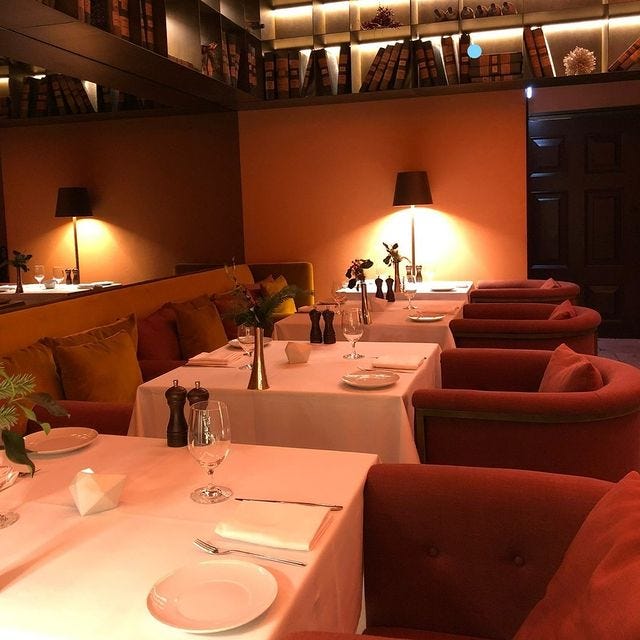

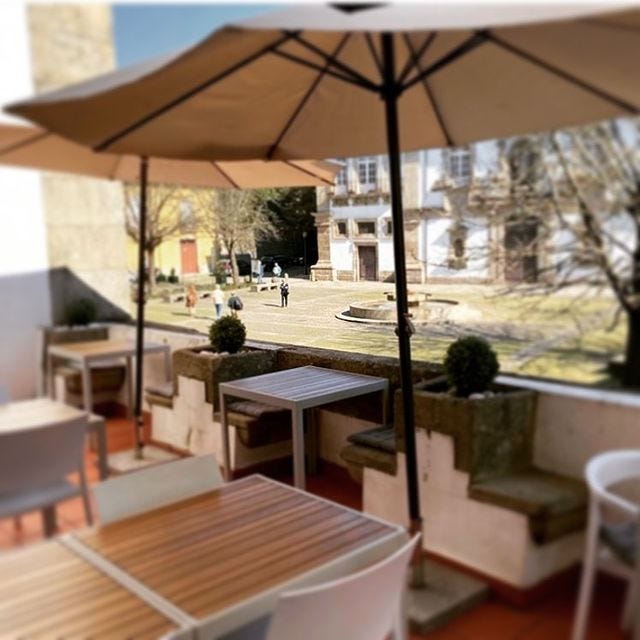


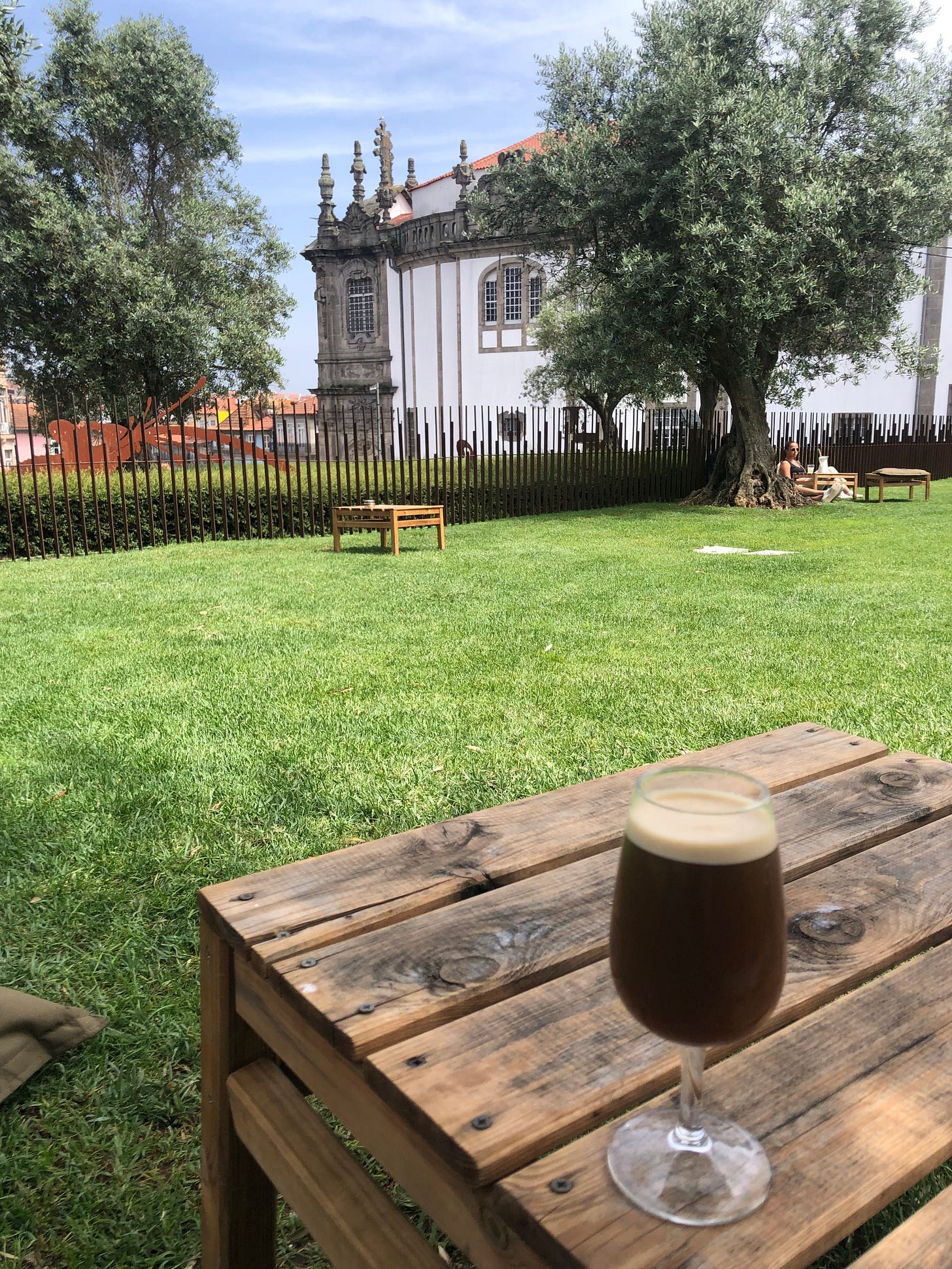
I'm nearly a month behind, Nicie (the last couple weeks hiding out on Maine islands), but wanted nevertheless to say you really hit a sweet spot for me with this sad and lovely postcard from the threshold of Pessoa's world. It's a fine writer who finds the nexus where Joni, Pessoa's Disquiet, hard grief, and hard walking meet. There's an echo perhaps of Pessoa's own multiplicity, his heteronyms, as we work our way down streets of sorrow, alleys of small joys, and unending paths where our eyes are all we have left. (Listen to Dylan's Dirt Road Blues for a version of the latter.)Then again, maybe that's just travel.
Pessoa's voice was manifold, by design, but in recalling the voice in Disquiet (which now I think I have to read again) the glib phrase which just came to mind is 'shaman without a cause.' There's the great depth and great presence of his voice, and the written fragments like torn corners of dreams arriving in a disorder (despite the editors'/translators' efforts) which nonetheless feels like intangible order, but all in service of what exactly? Given my current writerly view of the world, I suppose I could call him a voice in the desert of Anthropocene purposelessness, perhaps, or a mournful shipping clerk unclear on why we're all rowing in the direction of the Great Acceleration, though that all sounds a bit too cute.
Anyway, this is all to say I loved this post. Thanks for all you're doing, and look after yourself as you walk through the grief. Be well.
Photos are exquisite.